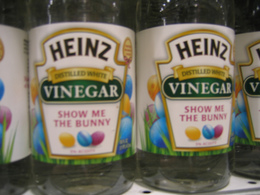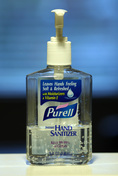Monofoil
I was contacted by the makers Coeus Technology, makers of Monofoil. I am very impressed with the product, so I asked if I could post about it because, unlike most germ killing sprays or wipes which kill the "current" germs, Monofoil continues to kill germs on the surface for a long time after being applied.
Monofoil is a revolutionary new antimicrobial product that uses a physical action as opposed to a chemical action in destroying microbes. This antimicrobial product is being used by area hospitals, schools, professional sports organizations, and theme parks. Countries like China, Saudi Arabia, and Australia have recently been introduced to this new technology. Monofoil destroys algae, fungi, bacteria, and viruses by attracting the harmful microbes to it. Then the cell membrane is pierced, bled out and then electrocuted. The technology of Monofoil enables the product to remain intact to the substrate it is applied to. Allowing it to stay in place for up to 30 days as continues to work time and time again. This ready-to-use product is available in gallons, spray bottles, and wipes. Coeus Technology has recently added to its product line a new laundry additive. Thus allowing the clothes we wear to be protected for up to 50 washes. Better yet, Monofoil is hypo-allergenic, non-toxic, and safe to use around children and pets. One of the benefits of using Monofoil is the cost effectiveness of the product. It is fairly priced when you consider how long it lasts you. No more need for us germaphobes to buy chemicals that can be harmful to humans and have no longevity anyway. Another benefit is in the way the antimicrobial works. The way it kills a microbe is unique in that it does not simply poison the cell, but destroys it. Most chemicals will poison or sicken the microbe, allowing it to adapt to the chemical. This is how a “superbug” is formed and is definitely life threatening. Not the case with Monofoil. This product completely eliminates the problem and sticks around to do it again. Monofoil is unconditionally registered with the EPA and is made in the USA. Coeus Technology is a Disabled Veteran Owned Small Business located in central Indiana. The partners who started the company are both from Indiana and have studied biology at Indiana University. Both also served in the military for their country. I am neither sponsoring nor endorsing their product. It just looks like a "game changer" to me. Related articles
1 Comment
 Copied from http://www.care2.com/greenliving/vinegar-kills-bacteria-mold-germs.html# Posted by Annie Bond on May 5, 1999. Vinegar is a mainstay of the old folk recipes for cleaning, and with good reason. The vim of the vinegar is that it kills bacteria, mold and germs. Heinz company spokesperson Michael Mullen references numerous studies to show that a straight 5 percent solution of vinegar—the kind you can buy in the supermarket—kills 99 percent of bacteria, 82 percent of mold, and 80 percent of germs (viruses). He noted that Heinz can’t claim on their packaging that vinegar is a disinfectant since the company has not registered it as a pesticide with the Environmental Protection Agency. However, it seems to be common knowledge in the industry that vinegar is powerfully antibacterial. Even the CBS news show “48 Hours” had a special years ago with Heloise reporting on tests from The Good Housekeeping Institute that showed this. Just like antibiotics, common disinfectants found in sponges and household sprays may contribute to drug resistant bacteria, according to researchers of drug resistance at Tufts New England Medical Center. Furthermore, research at the Government Accounting Office shows that many commercial disinfectants are ineffective to begin with, just like antibiotics. Keep a clean spray bottle filled with straight 5 percent vinegar in your kitchen near your cutting board, and in your bathroom, and use them for cleaning. I often spray the vinegar on our cutting board before going to bed at night, and don’t even rinse, but let it set overnight. The smell of vinegar dissipates within a few hours. Straight vinegar is also great for cleaning the toilet rim. Just spray it on and wipe off. Related articles  Ever notice that there are more commercials advertising antibacterial gels and related products? Every time I step into a grocery store there are antibacterial wipes for my shopping cart readily available. Or how about when you are waiting in line at the checkout stand? Chances are there’s a bin full of antibacterial products nearby. At the place where I work, there’s a Purel dispenser at every door entrance. Is it excessive? No. I’ll be the first to admit that I’m a germaphobe. And if something as simple as a modified strain of flu can take several lives, that’s enough proof to me that we need to have these products available to us at all times. Here are some key locations to keep antibacterial products handy. In your pocket! Think about all the things you touch and share with other people during the week. At work you come into contact with a number of co-workers and customers. You probably share the majority of office supplies and equipment, including computers, photocopiers, staplers, pens, with the entire company. On your days off you’re probably out doing chores. You’re touching door handles, shopping cart handles, toilet handles sink faucets in public restrooms, ATMs, meat at grocery stores. If you want to prevent yourself from contracting an infectious microbe, one rule of thumb to follow is that you sanitize after you leave each place you visit. You can do this by carrying around a small bottle of antibacterial gel that you can fit in your pocket or purse. At your kitchen sink. If you do a lot of cooking at home, you want to disinfect your hands before you touch the food which you are about to serve yourself and others. That’s health 101. But here’s something else to think about. Imagine all the dirty dishes that you put into your sink. So, you have germs from both people’s mouths and from food particles that become exposed and start to rot over time. Now, think about the sponge that you touch every time you wash the dishes. Chances are you don’t swap out your sponges everyday. Microbes can live for days on moist surfaces, which your sponge most definitely is the majority of times. Make it a habit to rub your hands with some antibacterial gel after you wash your dishes, and you will greatly reduce your exposure to infectious germs. At or near your dining room table. Our mouth being our largest orifice, it is the easiest path for dangerous microbes to take to get into our bodies. There is a reason why our parents pestered us about washing our hands before we ate, they didn’t want you to swallow down these microbes with your food! And if you’re a parent, you probably pester your own kids about washing their hands before they eat. But as you know, kids will seldom oblige to this request the first time. You probably have to tell them multiple times, or physically force them before they do it. Or they’ll simply lie about it. Sometimes you may even forget to tell your kids. Moreover, you as an adult, will sometimes fail to wash your hands before you eat. By having an antibacterial gel dispenser at your table, you will ensure that you and your family will have clean hands right before you serve the food, in case someone forgets or you suspect is lying about it. Related articles
|
Not Medical Advice
Everything in this blog is for entertainment and information only. It is NOT medical advice. Do not consider anything as medical advice and check with your physician before you take any action from any of our posts.
Categories
All
Archives
March 2020
AuthorI'm not in medicine. I'm just a mild germaphobe sharing information that I find. Interesting Sites |
 RSS Feed
RSS Feed
